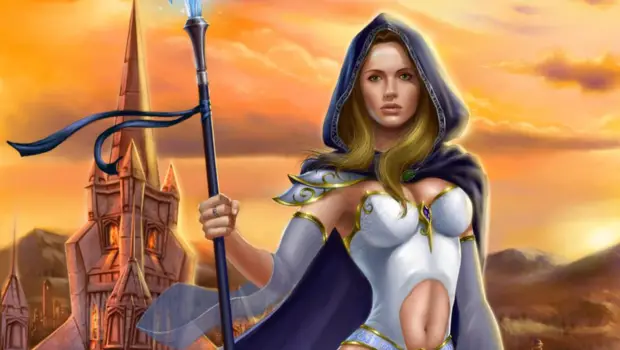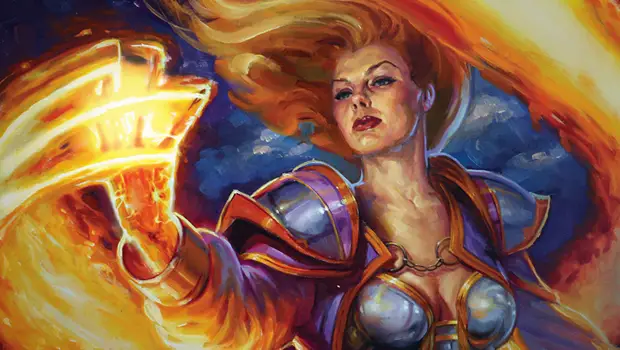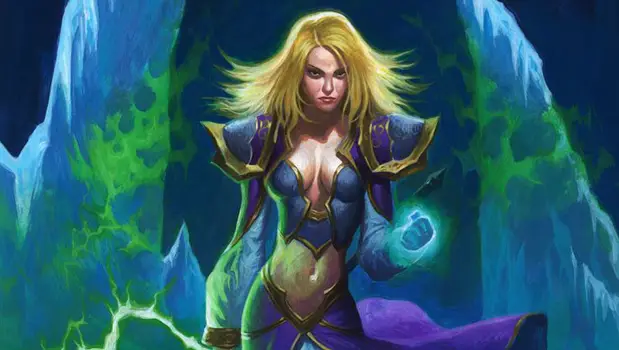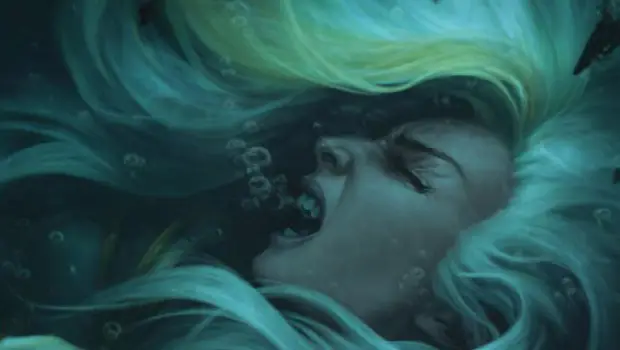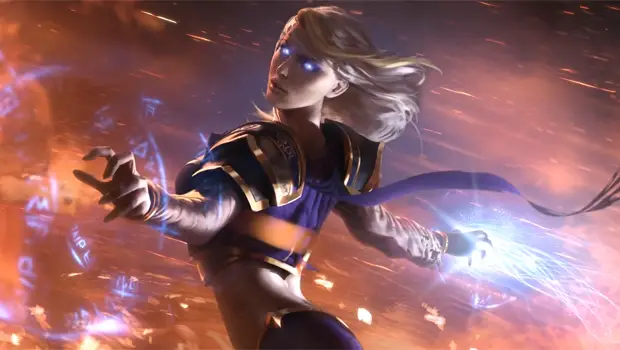Know Your Lore: Jaina Proudmoore
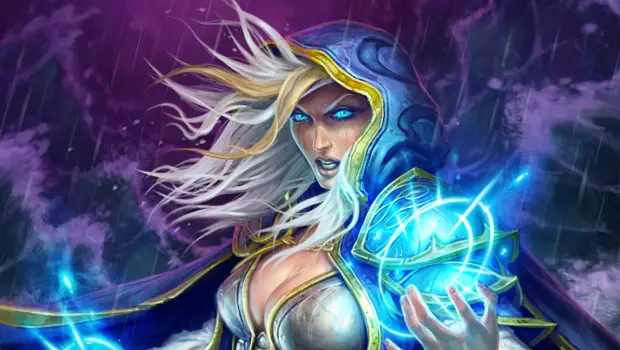
Although she’s not necessarily heavily involved with Draenor, Jaina Proudmoore, leader of the Kirin Tor, has made her presence known. And her current behavior is slightly confusing to those that have read the novel War Crimes, but not necessarily out of character. If anyone has had a long, long story in the Warcraft universe, it’s Jaina Proudmoore — and her journey from Grand Admiral’s daughter to powerful and influential leader has been tumultuous, to put it lightly.
Bright heart
Jaina’s story folds together in a way that is almost painful to look at — when she was young, she was the bright, promising daughter of a notable leader, and seemed to be destined to eventually sit at Arthas Menethil’s side as the Queen of Lordaeron. She had a remarkable aptitude for magic, sent to Dalaran to study with the Kirin Tor and eventually became the apprentice of Archmage Antonidas. And even at a young age, she showed sympathetic tendencies towards the orcs imprisoned in interment camps — despite the knowledge that orcs did, in fact, kill with impunity, the sight of an orc child imprisoned was enough to affect the young girl. It wasn’t that Jaina assumed that all orcs were good, it was that in that moment, she realized that orcs had children, likely had families just like her own, and started to look at them as people rather than monsters. Even at that early age, she demonstrated an eternal, boundless optimism that nothing seemed to crush.
Jaina grew up into a studious and charming, serious woman, and it was only natural that she and Arthas be drawn together. They were of the same age, they both came from high-ranking families, and while Arthas brought out the playful side of Jaina, she in turn brought out his more serious side. They complemented each other in a way that naturally worked — yet while Jaina was ready and fine with the idea of settling down, having children, and perhaps leaving her life of endless study behind for a more maternal role, Arthas was in no way ready to do the same. Yet even though he broke her heart, Jaina knew she would be all right. She immediately buried herself in her studies, occupied her thoughts with other things.
The two were briefly reunited, assigned together to investigate the disturbing plague that was spreading across Lordaeron. And although Jaina wanted to see the golden boy she’d fallen in love with years before, there was little that remained of him. His single-minded obsession with vengeance — even at the cost of his own people — disturbed her deeply, and when at last they arrived at the gates of Stratholme, his irrational actions were enough to finally make her turn away. Where once was a bright future lay only ashes and despair, and she recognized that, much as it pained her to see.
Bright future
Yet the future held much, much more for Jaina Proudmoore. Days later, as she wandered the streets of Stratholme and took in all that Arthas and his men had done, she was approached by a strange prophet, a man who had tried to speak to Antonidas, yet been turned away. Take them, he told her, take those you can save from the kingdom far away, across the sea to Kalimdor. And she did what Terenas and Antonidas failed to do — she listened, realized the sense in what the prophet was saying, and did as she was told. Lordaeron was falling all around her, the plague had no apparent cure, and the least she could do was save those that had yet to perish.
In Kalimdor, Jaina finally met Thrall, the leader of the new Horde, and saw for herself what kind of people these strange orcs were. Despite her initial mistrust, Jaina worked together with Thrall and with the night elves to end the Third War. That strange prophet that bid her to go to Kalimdor was none other than Medivh — son of the woman Jaina had idolized from a young age, a magister with power almost beyond comprehension.
The Third War wasn’t just a war — it was the beginning of Jaina’s freedom, in a way. Throughout her life she was restricted — by the formalities of her station, by those around her, by the rules and regulations of the Kirin Tor, possibly even by the views of her father. In Kalimdor, she was the one who was, at last, fully in control of her destiny, and she thrived because of it. The Burning Legion’s plans were brought to an end, and Jaina was left with the uncertain question of what to do next, and a vague idea of the answer — an answer that felt right to her. Diplomacy.
Brightly burning
Jaina believed in a world that was inherently good, and she believed that the creatures that existed on that world were inherently good as well, and she wasn’t about to back down on those beliefs, even when her family objected. She wanted what was best for the world — peace, a peace that would keep allies close and keep threats like the Burning Legion at bay. Her father, on the other hand, didn’t agree with her idealizations of the world, and made that clear when he traveled to Kalimdor and began ruthlessly killing any orcs he could find.
And Jaina let the orcs kill him. In that moment, she realized she had a choice — try to save a man who was determined to set the world ablaze, or turn away. Just as she had done with Arthas, Jaina turned away, and Grand Admiral Proudmoore ceased to be. In both cases, the men she loved were traveling single-minded down a path that would only lead to darkness. The world, after all, was only as good as the good you put into it — and as bad as the bad you put into it as well. And Jaina Proudmoore, practical and optimistic, knew that that cycle had to be broken.
It was a practical decision. It was the decision of a scholar, a student, someone able to step away from their emotions and make a calculated choice. It would haunt her for the rest of her days, just as Arthas continued to haunt her, years later, when the Lich King finally reared his head and made his presence in Northrend known. It’s easy enough to be practical, to leave the past in the past — it’s much harder to do so when the past comes back to haunt you in terrifying splendor.
When darkness falls
Jaina is strong, beyond measure. Anyone else would have broken entirely when confronted by a horrifying specter wearing their dead lover’s face. Arthas was dead, there was only the Lich King — but Jaina, optimistic as always, desperately hoped that there was some way he could be redeemed. That there was still a piece of Arthas, somewhere deep within. That somehow, the man she loved still lived on and could be reasoned with. When the truth hit her, it hit her hard.
And the punches kept right on coming. Shortly after the victory over the Lich King, the Cataclysm hit, tearing through Azeroth and igniting new squabbles over land and resources. Jaina’s efforts at diplomatic relations were all but extinguished when Thrall, the orc she was certain she could call a friend, left his position as leader of the Horde, and left Garrosh Hellscream in his place. Hellscream had no interest in diplomacy, and his efforts as a new leader seemed to be driving tensions between the different races allied with the Horde — Baine Bloodhoof’s appearance at Theramore in the wake of his father’s death spoke volumes.
And yet, Thrall remained curiously silent, far more preoccupied with saving the world from certain destruction. In a way, Jaina likely understood this — after all, the greater good was something she’d been working for her entire life.
Yet Theramore fell. It was obliterated, and the blood was there, plain as day on Hellscream’s hands. In that moment, Jaina Proudmoore finally snapped, and Orgrimmar nearly drowned for it — it was only Kalecgos that held her back, reminded her what she was fighting for. But that optimistic part of Jaina, the idealist, the practical woman fighting for a bright future, that aspect of Jaina died that day, fading just as quickly as summer’s gold from her hair.
Wary future
Jaina learned that all the optimism in the world could not change the fate of her people. It could not change the fate of the Alliance. It could not make Thrall turn around and see what Hellscream was doing, could not force him to stop the attack on Theramore before it got off the ground. Where once were people, honorable people if different from her own, there were now only beasts, savage and bloodthirsty, just as her father had told her. Her father, whom she allowed to be slaughtered by beasts that would later slaughter her friends, those she held as close as family, leaving nothing more than arcane dust and a crater where once they had laughed and spoke of bright futures for them all.
In return, she had the leadership of the Kirin Tor placed on her shoulders. And just as she had taken to her studies so many years ago, when Arthas had broken her heart, she took to leadership with the same single-minded voracity. As leader, she immediately turned a suspicious eye on those who were associated with the Horde, casting them out of the city with vicious, practical efficiency once they showed their hand and she realized they were at least in part responsible for Garrosh Hellscream getting his hands on the Divine Bell.
Maybe Taran Zhu’s words on the Isle of Thunder struck a temporary chord with her, the idea of a vicious cycle of hatred that only sustains itself being familiar to her already. But it didn’t change her mind. If Jaina had had her way, that cycle would have indeed ended completely when Garrosh Hellscream was defeated in the Siege of Orgrimmar. If there was one creature responsible for furthering that cycle, it was Garrosh Hellscream. If there was one faction responsible for furthering that cycle, it was the Horde. Break the Horde, break the cycle completely.
Cycle of hatred
She was denied the chance to see that happen. In War Crimes, Jaina is still struggling with the injustice of letting the Horde continue its existence in light of the horrific atrocities committed against her and her people. At the end of the novel, it appears that Jaina comes to a realization, and a lot of it has to do with a missive sent to her from Warchief Vol’jin.
It took some time for me to learn what happened in Dalaran. You used to be a woman of peace; you be that no more. Garrosh scorches earth, and the dead ain’t the only victims. You got no blame or hate from me, no matter what you feel toward Garrosh — or the Horde. We all got our ghosts.
–V
Jaina Proudmoore is a woman who has spent her life chasing what seems to be an inconceivable daydream, a bright and peaceful future. It’s something she’s learned to identify over the course of her life, this strange, pervasive cycle that feeds itself. She saw it in Arthas — darkness feeding darkness, driving him to self-destruction. She saw it in her father — the inability to see beyond old hatreds, to look at those with green skin as anything other than beasts for the slaughter. She saw it in Garrosh Hellscream — his steadfast refusal to accept anything other than total conquest.
And to her horror, she realized she was beginning to see it in the mirror, every morning.
The world will gladly give you what you feed into it. Jaina never wanted to live in a world of hatred. Vol’jin didn’t blame her, nor did he hate her for her beliefs — he simply understood them, and wanted to let her know as much, and in his own way, tentatively begin to break the cycle anew.
Does Jaina Proudmoore trust the Horde? No. Will she ever trust them again? That depends on the Horde, and their actions. As Jaina said in War Crimes, the Horde is not Garrosh Hellscream — the entirety of the faction should not be judged on the shoulders of one creature. But as Vol’jin said in patch 5.3, “We work together.We don’t even have ta like each other.” If the Horde wants any kind of diplomatic relations, they’ll have to prove they can be trusted, first — and they have yet to prove that to the leader of the Kirin Tor, regardless of what Khadgar has to say.
For now, Jaina Proudmoore is watching. She is giving the Horde a chance to show what it truly is, under this new leadership. But you can be certain that if she observes the cycle beginning anew, if she does not like what she is seeing, that cycle will be broken before it has a chance to feed itself into a world that deserves far better.
Please consider supporting our Patreon!
Join the Discussion
Blizzard Watch is a safe space for all readers. By leaving comments on this site you agree to follow our commenting and community guidelines.
 @Shadesogrey
@Shadesogrey